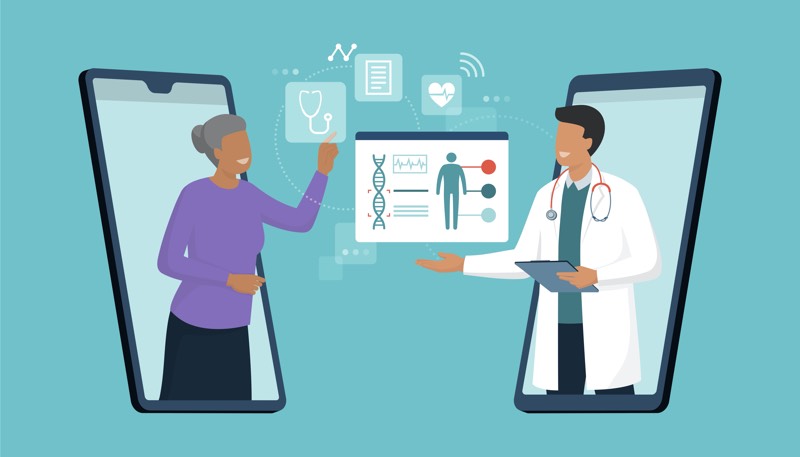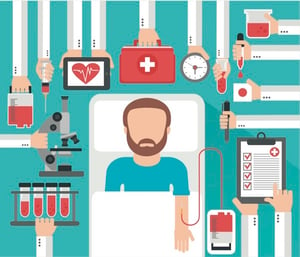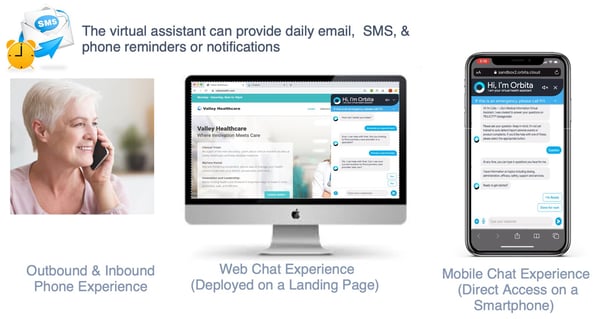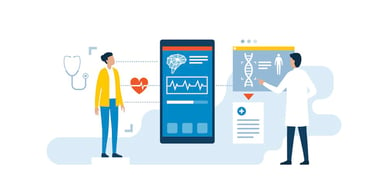
How Remote Patient Monitoring Empowers the Patient Care Journey and Self-Efficacy
The proliferation of artificial intelligence in healthcare has opened the door for a necessary shift in healthcare and related solutions from provider-centric to patient-centric. While you may think of healthcare as an inherently patient-oriented service, healthcare organizations have largely operated to support providers in their work.
"Hospital policies, practitioner admitting privileges, purchasing (especially in the OR), and scheduling have often developed around physician preferences."
-American Journal of Nursing
 Patient-centric care demands much more than just in-person appointments; it requires medical record reviews, test analyses, calls and emails, question answering, and the continuous monitoring of patients. Since the majority of this work does not require an in-person visit, it presents as additional work and time for providers on top of a busy schedule packed with patient visits.
Patient-centric care demands much more than just in-person appointments; it requires medical record reviews, test analyses, calls and emails, question answering, and the continuous monitoring of patients. Since the majority of this work does not require an in-person visit, it presents as additional work and time for providers on top of a busy schedule packed with patient visits.
Too often, healthcare providers are stretched too thin and lack adequate resources to reach this level of productivity. Patients routinely bear the brunt of the system's inefficiencies with difficult scheduling processes, hard-to-reach call centers, and inconveniently long waiting room times. This all feeds into the greater issue (and risk) of patients not being as active in their own care journey as they need to be.
The good news is that the recent shift to patient-centered care has empowered patients to be active decision-makers, which has amplified the need for engaging resources and tools to remotely monitor and support patients in becoming more self-sufficient. To streamline patient and provider communication and put knowledge and resources right into patients' hands, Orbita augments remote patient monitoring services with a virtual assistant solution.
This particular solution from Orbita has the capability to frame an outgoing message or notification to direct or guide the receiver's behavior towards a predicted action (tapping into the 'nudge theory'). There is a great deal of value in leveraging 'nudges' in the development of a remote patient monitoring solution to engage, inform, and empower patients. These nudges can include reminders, personalized educational information, and deliver easy access to scheduling, FAQs, and advanced natural language processing question-answering services.
Let's say a patient has high blood pressure - a helpful reminder is to drink lots of water throughout the day. A notification pushed to this patient via SMS, email, or phone delivers this reminder, and also provides context on the importance of monitoring high blood pressure and adhering to care plans.
 Previously, the lack of engaging material and fragmented communication through the patient journey and care cycle has led patients to lose momentum and not adhere to treatment plans. Orbita works to improve and enhance remote care to include continuous communication between patients and providers through a virtual assistant, paired with escalation to a live agent when necessary.
Previously, the lack of engaging material and fragmented communication through the patient journey and care cycle has led patients to lose momentum and not adhere to treatment plans. Orbita works to improve and enhance remote care to include continuous communication between patients and providers through a virtual assistant, paired with escalation to a live agent when necessary.
Orbita technology also supports wearable Fitbit and iHealth platforms, which have proven useful in the collection of health data and empowering patients in their own care by measuring heart rate, oxygen levels, glucose levels and more - and then relaying that data directly to healthcare providers' records.
Beyond improving communication and connectivity, OrbitaCONNECT enhances remote patient monitoring with the delivery of information on the patient's health trends and goals to illustrate the value of actively and efficiently participating in the management of their care.
In a year of major transformations within healthcare, Orbita's virtual assistant technology supports consistently evolving preferences and reinforces the industry's growing focus on remote patient monitoring and supporting the patient care journey.

